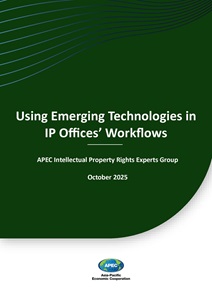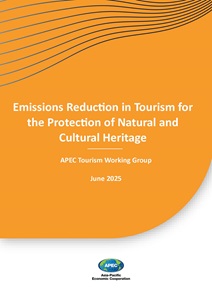
Reports
Using Emerging Technologies in IP Offices’ Workflows
The Asia-Pacific Economic Cooperation (APEC) is a regional economic forum established in 1989 to leverage the growing interdependence of the Asia-Pacific.
The Asia-Pacific Economic Cooperation (APEC) is a regional economic forum established in 1989 to leverage the growing interdependence of the Asia-Pacific.
APEC ensures that goods, services, investment and people move easily across borders. Members facilitate this trade through faster customs procedures at borders; more favorable business climates behind the border; and aligning regulations and standards across the region.
APEC ensures that goods, services, investment and people move easily across borders. Members facilitate this trade through faster customs procedures at borders; more favorable business climates behind the border; and aligning regulations and standards across the region.
APEC works to help all residents of the Asia-Pacific participate in the growing economy.
APEC works to help all residents of the Asia-Pacific participate in the growing economy.
Capacity building projects play an important role in helping translate APEC's goals into reality.
Capacity building projects play an important role in helping translate APEC's goals into reality.

Reports
•June 2025
Download Report
3MB
Published Under
SOM Steering Committee on Economic and Technical Cooperation (SCE), Tourism Working Group (TWG)
Accessed
592
Pages
72
This report provides an overview of research conducted into Asia-Pacific Economic Cooperation (APEC) economies efforts to reduce carbon emissions in tourism activities, with a focus on protecting natural and cultural heritage, provides high-level insight into the outcomes of a workshop hosted in Lima, Peru to support emissions reduction among public and private partners and provides guidance for governments and tourism and hospitality organizations to advance climate action and emissions reduction for the protection of natural and cultural heritage. The report highlights the significant impact of tourism on the environment and the necessity for sustainable practices to mitigate these effects.
Based on the outcomes of the report, the following next steps are proposed for interested stakeholders: Implementation of sustainable practices; Policy development and support; Community engagement and education; Monitoring and evaluation; Collaboration and partnerships.

